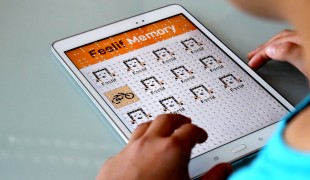- 5289
- 408
- 8
- 10
- 0
- Help Ukraine
About the solution
Susan Banks had a love of video games but found that her deafness would sometimes prevent from playing certain games. In one particular occasion, she bought a video game that at a certain stage requires players to be able to listen to the game’s environment – Susan couldn’t do that so she could not advance in the game. “I died about 15 times before I realized I wouldn’t be able to do that part. Being that it was maybe an hour into the game, I’d just wasted $60”, Susan explained.
The game didn’t have any warning advising for the fact that players with hard-of-hearing conditions wouldn’t be able to play. So, Susan was inspired to create a blog where she would review games based on their accessibility. Together with her friend Courtney Craven they launched OneOddGamerGirl.com, in 2014. Courtney has lupus, which sometimes affects her hands, making it sometimes uncomfortable to use game controllers or computer mouses. As a consequence of another disease, she also became har of hearing.
To review the games, Susan would first play it and take not of all the parts she struggled with. Courtney, who doesn’t have hearing problems, would then play it herself to see if she also struggled with the same parts or if Susan’s struggles where indeed related to her deafness. They would then play it together to see if there was something Susan was missing because she couldn’t hear.
Their project was very successful and in 2018 they expanded it and launched “Can I Play That”, a game review platform aimed at the entire disabled community of gamers. The platform focuses “exclusively on the ever-growing presence and adoption of accessibility features within the gaming industry” with the objective of “influencing game updates, keeping disabled gamers informed, and providing a voice for one of the largest player bases in the industry.”
Adapted from: https://www.digitaltrends.com/gaming/deaf-gamers-making-gaming-more-acce...
https://www.digitaltrends.com/gaming/who-better-to-review-a-game-for-acc...
https://butwhythopodcast.com/2019/08/15/interview-a-conversation-about-a...
More information: https://caniplaythat.com/
https://caniplaythat.com/about-can-i-play-that/
This solution shall not include mention to the use of drugs, chemicals or biologicals (including food); invasive devices; offensive, commercial or inherently dangerous content. This solution was not medically validated. Proceed with caution! If you have any doubts, please consult with a health professional.
DISCLAIMER: This story was written by someone who is not the author of the solution, therefore please be advised that, although it was written with the utmost respect for the innovation and the innovator, there can be some incorrect statements. If you find any errors please contact the patient Innovation team via info@patient-innovation.com
-
-
777
-
0
-
15066

Student invents Braille glove for deaf people
COMMUNICATION: Communicating, whether by speaking, listening, or other means
Congenital Deafness
Body-Worn solutions (Clothing, accessories, shoes, sensors...)
Assistive Daily Life Device (to help ADL)
AI algorithm
Enhancing health literacy
Promoting inclusivity and social integration
Improving Speech and Communication
Raise awareness
Otorhinolaryngology
United States
-
-
-
788
-
2
-
13193

Feelif is a multimedia device for blind and visually impaired people
COMMUNICATION: Communicating, whether by speaking, listening, or other means
Reading
Video gaming
Blindness
Visual Impairment
Congenital Deafness
Hearing Disorders
App (Including when connected with wearable)
Videogame
Educational/Leisure device (book, toy, game...)
Vision problems
Hearing loss or ringing in the ears (tinnitus)
Managing Neurological Disorders
Improving Speech and Communication
General and Family Medicine
Medical Genetics
Neurology
Ophthalmology
Otorhinolaryngology
Pediatrics
Slovenia
-
-
-
696
-
1
-
12941

Man invents wristband to help deaf people be more aware of their surroundings
COMMUNICATION: Communicating, whether by speaking, listening, or other means
Social interaction
Congenital Deafness
Assistive Daily Life Device (to help ADL)
5 Senses support devices: (glasses, hearing aids, headphones...)
AI algorithm
Difficulty speaking or understanding speech
Cognitive impairment
Confusion
Sensory disturbances (e.g., hypersensitivity to touch, temperature changes)
Regaining sensory function
Promoting inclusivity and social integration
Improving Speech and Communication
Otorhinolaryngology
South Africa
-
 en
en